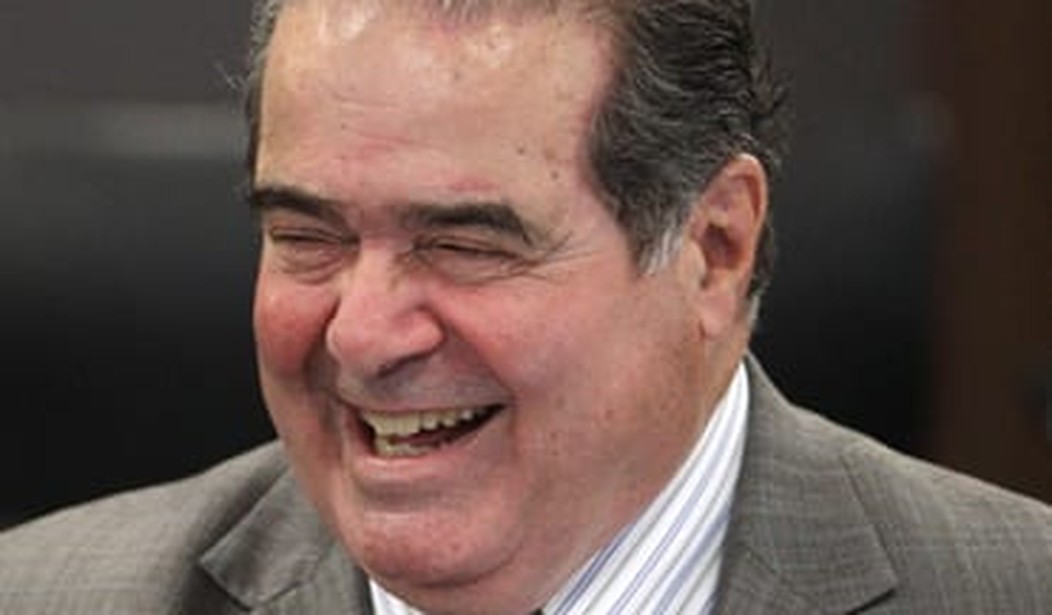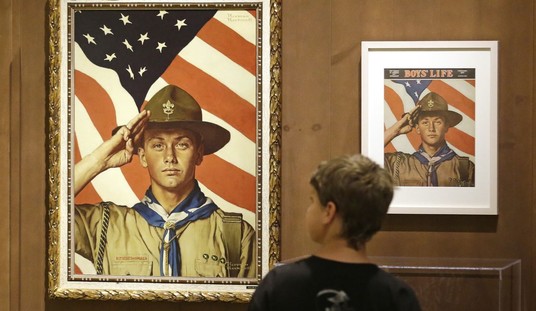“Thank God for Justice Scalia.”
I’ve often found myself muttering that exhortation in recent years. I repeated it last June, for example, when reading Scalia’s masterly dissent to Obergefell, et al. v. Hodges, Director, Ohio Department of Health, et al., the Supreme Court ukase that took the definition of what counts as marriage away from the states and delivered into the hands of one man, Justice Anthony Kennedy, the Madame Blavatsky of the Bench. Kennedy looked into his crystal ball and determined that henceforth so-called “gay marriage” should be legal across the fruited plain. Why? Because, Kennedy wrote, “the Constitution promises liberty to all within its reach, a liberty that includes certain specific rights that allow persons, within a lawful realm, to define and express their identity.” Er, what? Had he written such nonsense, Scalia retorted, he would “hide [his] head in a bag.” “The Supreme Court of the United States,” he continued in what is one of my favorite legal footnotes, “has descended from the disciplined legal reasoning of John Marshall and Joseph Story to the mystical aphorisms of the fortune cookie.”
Indeed. And Scalia was pointed as well as droll. You might think, or at least say when the children ask, that the United States of America is a democracy in which We, the People are sovereign. Ha, ha, ha. Really, Scalia pointed out, we are an extreme oligarchy in which “the Ruler of 320 million Americans coast-to-coast, is a majority of the nine lawyers on the Supreme Court,” all of whom went to Harvard or Yale. Feeling better?
And just yesterday, speaking at a Roman Catholic school in Metairie, Louisiana, Scalia pointed out that, contrary to some extreme secularists, government support for religion is not only justified by the Constitution but has throughout most of our history been the unspoken norm. Moreover, he argued, “one of the reasons” that the Untied States has prospered so mightily is that the American people have always done God honor. “God has been very good to us, “ he said. “That we won the revolution was extraordinary. The Battle of Midway was extraordinary. I think one of the reasons God has been good to us is that we have done him honor. Unlike the other countries of the world that do not even invoke his name we do him honor.”
Yikes! Don’t tell Richard Dawkins (or, if you run into him, Christopher Hitchens). Such chaps are allergic to religion. But Scalia was right. As one account of his talk observed, “At the time the Constitution was written, religion was ubiquitous.”
Scalia noted that Thomas Jefferson, who first invoked the idea of a “wall of separation between church and state,” also penned Virginia’s religious freedom law, founded a university with dedicated religious space and, in writing the Declaration of Independence, regularly invoked God.
Jefferson is an interesting case. He, along with Ben Franklin, are prime exhibits in the secularist brief that the Founders were a-religious if not downright antireligious. But Franklin, one of the least religious of the Founders, wanted some mention of God in the Constitution. According to the historian Gertrude Himmelfarb, Franklin even proposed that the proceedings of the Constitutional Convention begin with a daily prayer. Militant secularists will quote Jefferson’s brusque dismissal of religion in Notes on the State of Virginia: “It does me no injury for my neighbor to say there are twenty gods or no god. It neither picks my pocket nor breaks my leg.” But they somehow never get around to quoting the passage that occurs a few pages later: “Can the liberties of a nation be thought secure when we have removed their only firm basis, a conviction in the minds of people that these liberties are the gift of God?”
As President, Jefferson was even more respectful of religion, and specifically Christianity, as the foundation of liberty and public virtue. According to one anecdote, Jefferson was met by a friend on his way to church one Sunday,
“You going to church Mr. J. You do not believe a word in it.”
“Sir [Jefferson replied], no nation has ever yet existed or been governed without religion. Nor can be. The Christian religion is the best religion that has been given to man and I as chief Magistrate of this nation am bound to give it the sanction of my example. Good morning Sir.”
Can you imagine Barack Hussein Obama replying as did Jefferson? To ask the question is to answer it.
It is sometimes objected that, whatever lip-service the Founders gave to Christianity, their conception of religion was (the word “merely” implicitly supplied) pragmatic or utilitarian. Well, there was no doubt that the Founders thought religion was pragmatic, that is, socially useful, i.e., not merely a private affair with God. But why the implicit “merely”? As Himmelfarb argues in “The American Enlightenment: The Politics of Liberty” (reprinted in her book The Roads to Modernity: The British, French, and American Enlightenments), “this view of religion is not unworthy.”
To look upon religion as the ultimate source of morality, and hence of a good society and a sound policy, is not demeaning to religion. On the contrary, it pays religion—and God—the great tribute of being essential to the welfare of mankind. And it does credit to man as well, who is deemed capable of subordinating his lower nature to his higher, of venerating and giving obeisance to something above himself.
This is essentially what Justice Scalia argued in Metairie. Yet the press accounts I’ve seen range from mildly bemused — “Is he really arguing that religion, and Christianity for that matter, have a place in the American public square?” — to outright hostile. The AP report, for example, ended by noting that Scalia “is often a lightning rod for controversy on the court.” “In December,” the AP reminded its readers, “he came under fire for comments he made during an affirmative action case, questioning whether some black students would benefit from going to a ‘slower-track school’ instead of Texas’ flagship campus in Austin.”
Here’s an uncomfortable question. Is there anyone, even a reporter for the Associated Press, who does not agree that “some black students would benefit from going to a ‘slower-track school’”? The issue was a essentially a non sequitur, dragged into the story because it was assumed (probably rightly) that the AP’s core readers would disapprove of anyone actually saying what Scalia said, even if “some students” of any color would benefit from attending a “slower-track” school. But of course we are close to trespassing upon forbidden territory here, that undiscovered country from whose borne no academic traveler returns, at least not with his tenure intact.
In my view, Justice Scalia was right in his remarks about affirmative action, but that is incidental to his point about the place of religion in American civic life. Our country, like much of the West, has been sorely tested in the last decade or so. The United States is still the most powerful and productive nation the world has ever seen. But someday it too will fade or perish just as Athens, Rome, and other great civilizations have faded or perished. Is the end, or the beginning of the end, at hand? No one’s crystal ball is sufficiently clairvoyant to allow us to say. For decades, we have been getting bulletins about the decline of the West, the rise and (especially) the fall of great powers, etc., etc.
So far, the West—or at least the United States—has disappointed its self-appointed undertakers.
How do we stand now, near the beginning of the twenty-first century? It is worth remembering that besieged nations do not always succumb to the forces, external or internal, that threaten them. Sometimes, they muster the resolve to fight back successfully, to renew themselves. Today, America faces a host of new challenges. A rapidly arming China and newly militant Russia have introduced new complexities to America’s strategic calculations. Militant Islam and global terrorism continue their battle to spread Sharia law to the West. Those minatory forces will fail in proportion to our resolve to defeat them. The question is, Do we still possess that resolve? Inseparable from resolve is self-confidence, faith in the essential nobility of one’s regime and one’s way of life. To what extent do we still possess, still practice that faith?
America also faces numerous internal threats, from the rise of immigration without assimilation to the dissolute forces of cultural decadence and radical multiculturalism, to the destabilizing assaults of a protracted financial crisis. A stupefying mountain of debt threatens the economic future of America while the forces of multiculturalism preach the dogma of bureaucratic cosmopolitanism. They encourage us to shed what is distinctively American in order to accommodate the quivering sensitivities of “humanity”—that imperious abstraction whose exigent mandates are updated regularly by such bodies as the United Nations, the World Court, and their allies in the professoriate and the liberal media. We face a choice between a multicultural future and an American future. Which will it be?
In Washington’s Crossing (2004), his marvelous book on Washington’s leadership in the Revolutionary War, David Hackett Fischer argues that America won the war against a much larger, better trained, and better equipped army partly because of the “moral strength of a just cause” and partly because of “religion”: “Americans,” he notes, sounding very much like Antonin Scalia, “were a deeply spiritual people, with an abiding faith that sustained them in adversity.”
Americans are still a deeply spiritual people, though many of our intellectual, cultural, and political leaders would have us forget that fact. In 1973, the late Irving Kristol observed that
for well over a hundred and fifty years now, social critics have been warning us that bourgeois society was living off the accumulated moral capital of traditional religion and traditional moral philosophy, and that once this capital was depleted, bourgeois society would find its legitimacy ever more questionable. These critics were never, in their lifetime, either popular or persuasive. The educated classes of liberal- bourgeois society simply could not bring themselves to believe that religion was that important to a polity. They could live with religion or morality as a purely private affair, and they could not see why everyone else—after a proper secular education, of course—could not do likewise.
Today, Kristol wrote two decades later, “the delicate task” we face is not to reform “the secular rationalist orthodoxy. Rather, it is to breathe new life into the older, now largely comatose, religious orthodoxies—while resisting the counterculture as best we can, adapting to it and reshaping it where we cannot simply resist.”
Now, in the second decade of the twenty-first century, we have a glorious opportunity—perhaps it is the last such opportunity—to start repaying some of the moral capital with which we have been so profligate in recent decades. Some sages assure us that our fate is sealed, that inevitable forces have scripted the (unhappy) denouement of American civilization. I do not believe them.








Join the conversation as a VIP Member